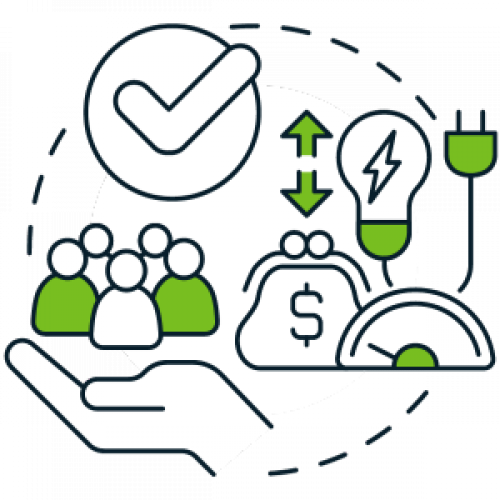How Credit Unions Help Communities
Credit Unions have been around for more than a hundred years, providing their members with financial product and services derived from the collective abilities of each member. As not-for-profit organizations, they prioritize the needs of their customers over profit gains by offering reduced loan fees and higher interest rates on savings products. Furthermore, they extend beyond conventional banking to positively impact the communities in which they serve.
In this article, we will explore the benefits and impact of credit unions on communities, based on the content from various articles that discuss this topic.
Benefits of Credit Unions in Communities
Credit unions are committed to strengthening their local communities in a variety of ways, such as delivering financial education programs, funding charitable causes, hosting community events and providing loans and grants for small businesses and neighborhood development plans. As they give back to the people around them in these meaningful ways, credit unions help develop sturdy and sustainable neighborhoods.
Financial Education
Credit unions are devoted to helping people become more informed when it comes to financial decisions with their accounts. To achieve this, they offer a variety of resources such as workshops and seminars that discuss topics like budgeting, saving strategies, credit management, and investing. Through these offerings and their online educational materials, these organizations demonstrate their commitment to empowering members - ultimately leading towards achieving greater economic stability in communities across the nation.
Support for Local Charities
A credit union can be immensely influential to the health of its local community. They contribute money and resources to charities, non-profits, and causes that benefit those in need. Additionally, some credit unions go above-and-beyond by establishing dedicated charitable foundations specifically devoted to helping others. Whether it's through volunteering time or sponsoring events aimed at resolving social issues, these financial institutions demonstrate unwavering commitment towards making a positive difference in their community as a whole.
Sponsorship of Community Events
Credit unions are renowned for their commitment to strengthening local communities by sponsoring festivals, concerts, and sporting events. Such festivities bring people together while also backing up small businesses and stimulating economic growth in the area. Through these efforts, credit unions demonstrate a genuine dedication to supporting their neighborhood's development.
Loans and Grants for Small Businesses and Community Development
Credit unions provide loans and grants to small businesses and community development projects that may not qualify for traditional bank financing. These loans can help to create jobs, revitalize neighborhoods, and support economic growth in underserved areas. By providing this funding, credit unions help to fill a gap in the financial services market and promote economic development in their communities.
Impact of Credit Unions in Communities
The benefits of credit unions in communities are significant. They help to build strong and resilient communities by promoting financial literacy, supporting local charities and non-profits, sponsoring community events, and providing loans and grants to small businesses and community development projects. But how do these benefits translate into impact?
Economic Impact
Credit unions have a significant economic impact on the communities they serve. They provide loans and other financial services to individuals and small businesses, which helps to stimulate local economies. By keeping money in the community, credit unions help to create jobs, support small businesses, and promote economic growth.
A study conducted by the Canadian Centre for the Study of Co-operatives found that credit unions have a positive impact on the local economy. The study found that for every dollar of assets held by credit unions in a community, an additional $1.64 in economic activity is generated. This means that credit unions have a multiplier effect on the local economy, creating jobs and supporting businesses.
Social Impact
Credit unions also have a social impact on the communities they serve. They help to address social issues and support initiatives that benefit their communities. By supporting local charities and non-profits, sponsoring community events, and providing loans and grants to small businesses and community development projects, credit unions help to improve the quality of life in their communities.
Credit unions also promote financial literacy and empower people to make informed financial decisions. This can lead to better financial outcomes for individuals and families, which can have a positive ripple effect on their communities. When people have better financial stability, they are less likely to experience financial stress and more likely to contribute to their local economy.
Environmental Impact
Credit unions are also making efforts to make conscious business decisions that reduce their environmental impact. Many credit unions locations have implemented sustainability practices in their operations and have adopted environmentally friendly policies. For example, some credit unions offer loans for energy-efficient home improvements or electric vehicles, and some have installed solar panels on their buildings. By promoting sustainable practices, credit unions can help to reduce their carbon footprint and contribute to a healthier environment.
Political Impact
Credit unions also have a political impact on their communities. As member-owned cooperatives, credit unions are governed by their members and operate democratically. They also advocate for policies that benefit their members and communities, such as consumer protections, affordable housing, and access to financial services. By advocating for these policies, credit unions can help to create a more equitable and just society.
Employment Opportunities
A credit union not only offer loans and financial services like a checking account, car loan , mortgage or online banking to its members, but also employment opportunities. As credit union is often community-based and locally owned, and is more likely to hire employees from the local area. This helps to create more job opportunities in the community and provides a stable source of income for many families.
Personalized Service
Credit unions are known for their personal service to members. As a not-for-profit financial cooperative, a credit union focuses on the needs of its members and prioritizes member service and member concerns. Unlike traditional banks, credit unions are not driven by profits, which allows them to focus on providing products like fee-free personal checking or simply personalized service to their members. This service often includes customized financial solutions and products tailored to the specific needs of their members.
Lower Fees and Interest Rates
Credit unions are known for their lower fees and interest rates on loans and credit products compared to traditional banks. This is because credit unions are not-for-profit organizations that do not have to pay dividends to shareholders. Instead, credit unions can reinvest their profits back into their members in the form of lower fees and interest rates. This can help members save money on their financial products and services and can also benefit the community by keeping more money circulating locally.
Cooperative Structure
Credit unions are structured as cooperatives, which means that members have a say in how the credit union is run by running for the board of directors if they are eligible. Credit union board members are elected volunteers that responsible for making decisions on how the credit union conducts its affairs . Board members also have the ability to vote on important decisions, how much to pay on fees, the locations of future branches, business considerations, personal banking operations, and more. This cooperative structure helps to create a sense of ownership and involvement among members, which can lead to a stronger sense of community and more engagement in local issues.
Financial Stability
Credit unions can be much more reliable than traditional banks in financial matters. They are obligated to keep higher capital reserves compared to banks, making them better able to withstand economic hardship. Furthermore, credit unions usually employ a more judicious lending strategy which greatly reduces risk and provides long-term monetary stability.
Access to Financial Services
Credit unions are an invaluable resource, opening doors to financial services like a savings account, checking account, car loan or mortgage loan for those that have been traditionally underserved. People who may be deemed too high-risk by banks for a traditional loan can still reap the benefits of a range of products and services from credit unions, like small loans, free checking accounts, and even credit counseling. Credit unions allow economic inclusion in communities through their offerings - assisting populations in need with their finances and ultimately reducing inequality.
Community Engagement
Credit unions are passionate about giving back to their local communities. They often host and sponsor events, charities, and volunteer programs that strengthen the sense of community while helping those in need. Additionally, credit unions regularly partner with schools and other organizations to provide financial literacy training as well as supporting initiatives designed for the benefit of all members within their neighborhoods.
Enhanced Member Experience
Credit unions are devoted to delivering a superior member experience, with many offering mobile and online banking services, 24/7 customer support, and other amenities that make doing business easier for members. Moreover, they often have incentives or rewards programs to stimulate their customers into using the financial products and services available.
Join a Credit Union Today!
In summary, credit unions are a vital part of their respective communities. Not only do they supply financial services and promote monetary literacy, but also back up local charities and non-profits, host community functions, as well as offer loans and grants to small enterprises and group growth projects. All in all, credit unions have an immense economic influence on the environments that they inhabit - socially fostering change with environmental sustainability at its core while being politically active within the space it serves.
Credit unions offer a unique alternative to traditional banks, prioritizing the needs of their members over profits. They are community-focused institutions that work to build strong and resilient communities, and their impact goes beyond just financial services.
If you are looking for a financial institution that values your needs and has a positive impact on your community, consider joining a credit union. They offer many benefits, including lower fees and interest rates on loans, higher yields on savings accounts, and a range of financial products and services tailored to your needs. Additionally, by joining a credit union, you can support the economic, social, environmental, and political development of your community.



























